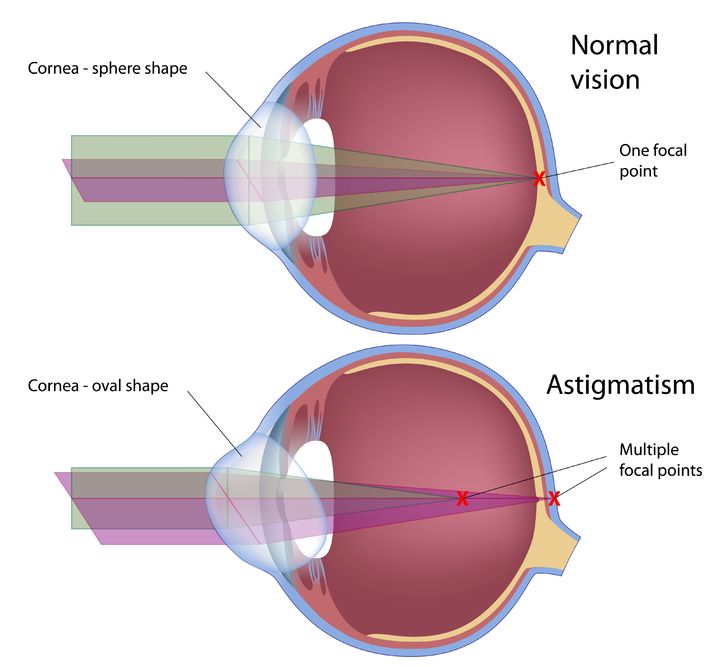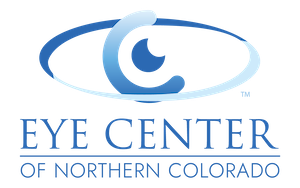Toric Intraocular Lenses
A Toric intraocular lens is a great way to correct your astigmatism at the time of cataract surgery.
Astigmatism is very common. It can cause blurry vision and may be corrected a variety of ways; glasses, contacts, laser eye surgery or by a toric intraocular lens at the time of cataract surgery.
Astigmatism
If you have astigmatism it means that your eye that is shaped more like and egg than perfectly round like a ball. This irregular shape makes your vision blurry and needs to be corrected for your ideal vision.
Your cataract surgeon will need to measure the shape of your cornea to know how much astigmatism you have. If you have enough astigmatism to make your vision blurry, you may be a good candidate for toric intraocular lenses often called toric intraocular lens.
Some patients do not have astigmatism or have so little that no astigmatism correction is needed at the time of cataract surgery. These patients do not need toric intraocular lenses and are better served with a standard IOL.
Toric Intraocular Lens vs. Glasses
Just like a pair of glasses can have astigmatism correction in the lens, an intraocular lens can also have the astigmatism correction built right into it. A lens implant that correct astigmatism is called a toric intraocular lens.
Recently I was able to help a friend I will call Wendy She had been near sighted with a lot of astigmatism since she was young. She adapted well to her visual problems throughout her life, but when it was time for her cataract removal procedure she jumped at the chance to have her astigmatism corrected with a toric intraocular lens. She reflected on how hard it had been to get good glasses prescriptions and to keep her glasses adjusted correctly over the years.
A toric intraocular lens definitely was the right choice for her and she is elated with her vision. While I cannot promise that you would share her same enthusiasm, her results are typical for many with moderate and high levels of astigmatism. Patients that have suffered with astigmatism throughout their lives that choose a toric intraocular lens tend to be the happiest of all my cataract removal patients.
The toric intraocular lens generally gives better optical quality than glasses because the intraocular lens corrects the vision inside the eye so you are always looking through the center of the lens and it can’t move. The toric intraocular lens locks into place shortly after cataract surgery, making it very stable over the course of your life.
Glasses, on the other hand, sit out away from your eyes so they can slip out of place as you move your head, be out of adjustment, or dirty. Even if you are planning to wear glasses full time after cataract surgery, fixing the astigmatism with a toric IOL usually makes your glasses thinner, lighter, and easier to keep in adjustment. If you choose a toric intraocular lens, it is very likely that you will not need glasses for distance vision. In case you can’t tell, I love these toric intraocular lenses for my patients.

Types of Toric Intraocular Lenses
The Acrysoft toric IOL is the only toric intraocular lens implant that has both uv protection and high energy blue protection, which protects the retina from the sun and decreases night glare. It has a long track record of success.
The Technis Toric IOL and the enVista Toric intraocular lens were recently FDA approved and both have UV protection and good clinical data for safety and vision correction. The Acrysoft, Technis, and enVista are all single vision intraocular lenses.
The Crystalens Trulign is a toric intraocular lens with some unique features. This toric IOL has astigmatism correction built into an implant that can accommodate for different distances to decrease your need for glasses for computer and reading.
The clinical data for the multifocal ReSTOR Toric intraocular lens has been submitted to the FDA. When it is approved, it will be the first toric multifocal lens for both distance and near vision without glasses in the U.S.
The Cost of Toric Intraocular lenses
Surgical cataracts are considered medically necessary so standard IOLs are covered by most insurance companies. Correcting astigmatism is not considered medically necessary since you could choose to wear glasses instead. For this reason, the toric intraocular lens is considered an advanced technology upgrade.
Insurance companies cover the medically necessary part of cataract removal, but if a toric intraocular lens are used, there is some additional charge that you pay out-of pocket for the upgrade to the better IOL. The additional monies cover the expenses to purchase the higher priced toric intraocular lens and for the extra testing done to prepare for the astigmatism surgery.
Side Effects of the Toric Intraocular Lens
The main risk for a toric intraocular lens is that we correct most, but not quite all of your astigmatism. Prior to your surgery, a series of measurements are performed to determine how much astigmatism needs to be treated. We measure your astigmatism using several different machines to increase our accuracy. This process is important, but not perfect. As a result, there could still be some amount of astigmatism remaining.
If your eye surgeon uses the ORA alignment system during surgery, the accuracy of astigmatism correction is greatly improved.
If you have enough astigmatism left over to affect your vision, there are options to further decrease the astigmatism. These include glasses, contact lenses, limbal relaxing incisions, or laser vision correction.
A second category of risk is that the toric intraocular lens moves out of position before permanently locking in. This is rare and could require a quick return to the operating room to reposition the IOL.
There are other potential complications that can occur with IOLs that are not specific to the toric intraocular lens.
If you have further questions about toric lenses, please schedule an appointment to meet with me or post a question in the comment sections below.
Gary J.L. Foster, MD
Board Certified Ophthalmologist
Cataract and Refractive Surgery
Fort Collins, Colorado 80525
